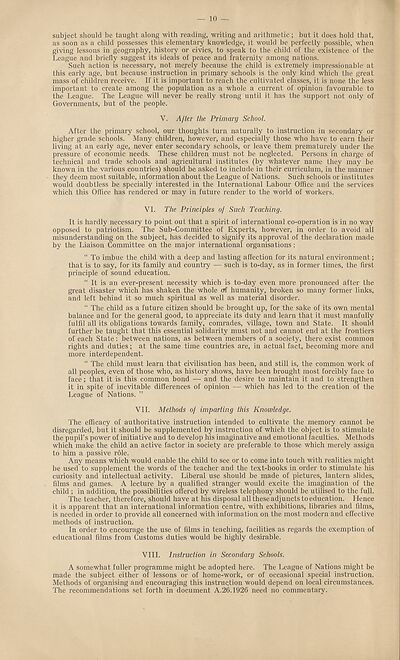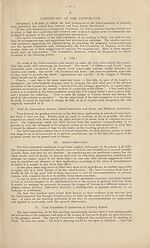Download files
Complete book:
Individual page:
Thumbnail gallery: Grid view | List view

— 10 —
subject should be taught along with reading, writing and arithmetic; but it does hold that,
as soon as a child possesses this elementary knowledge, it would be perfectly possible, when
giving lessons in geography, history or civics, to speak to the child of the existence of the
League and briefly suggest its ideals of peace and fraternity among nations.
Such action is necessary, not merely because the child is extremely impressionable at
this early age, but because instruction in primary schools is the only kind which the great
mass of children receive. If it is important to reach the cultivated classes, it is none the less
important to create among the population as a whole a current of opinion favourable to
the League. The League will never be really strong until it has the support not only of
Governments, but of the people.
V. After the Primary School.
After the primary school, our thoughts turn naturally to instruction in secondary or
higher grade schools. Many children, however, and especially those who have to earn their
living at an early age, never enter secondary schools, or leave them prematurely under the
pressure of economic needs. These children must not be neglected. Persons in charge of
technical and trade schools and agricultural institutes (by whatever name they may be
known in the various countries) should be asked to include in their curriculum, in the manner
they deem most suitable, information about the League of Nations. Such schools or institutes
would doubtless be specially interested in the International Labour Office and the services
which this Office has rendered or may in future render to the world of workers.
VI. The Principles of Such Teaching.
It is hardly necessary to point out that a spirit of international co-operation is in no way
opposed to patriotism. The Sub-Committee of Experts, however, in order to avoid all
misunderstanding on the subject, has decided to signify its approval of the declaration made
by the Liaison Committee on the major international organisations:
“ To imbue the child with a deep and lasting affection for its natural environment;
that is to say, for its family and country — such is to-day, as in former times, the first
principle of sound education.
“ It is an ever-present necessity which is to-day even more pronounced after the
great disaster which has shaken the whole of humanity, broken so many former links,
and left behind it so much spiritual as well as material disorder.
“ The child as a future citizen should be brought up, for the sake of its own mental
balance and for the general good, to appreciate its duty and learn that it must manfully
fulfil all its obligations towards family, comrades, village, town and State. It should
further be taught that this essential solidarity must not and cannot end at the frontiers
of each State: between nations, as between members of a society, there exist common
rights and duties; at the same time countries are, in actual fact, becoming more and
more interdependent.
“ The child must learn that civilisation has been, and still is, the common work of
all peoples, even of those who, as history shows, have been brought most forcibly face to
face; that it is this common bond — and the desire to maintain it and to strengthen
it in spite of inevitable differences of opinion — which has led to the creation of the
League of Nations. ”
VII. Methods of imparting this Knowledge.
The efficacy of authoritative instruction intended to cultivate the memory cannot be
disregarded, but it should be supplemented by instruction of which the object is to stimulate
the pupil’s power of initiative and to develop his imaginative and emotional faculties. Methods
which make the child an active factor in society are preferable to those which merely assign
to him a passive role.
Any means which would enable the child to see or to come into touch with realities might
be used to supplement the words of the teacher and the text-books in order to stimulate his
curiosity and intellectual activity. Liberal use should be made of pictures, lantern slides,
films and games. A lecture by a qualified stranger would excite the imagination of the
child ; in addition, the possibilities offered by wireless telephony should be utilised to the full.
The teacher, therefore, should have at his disposal all these adjuncts to education. Hence
it is apparent that an international information centre, with exhibitions, libraries and films,
is needed in order to provide all concerned with information on the most modern and effective
methods of instruction.
In order to encourage the use of films in teaching, facilities as regards the exemption of
educational films from Customs duties would be highly desirable.
VIII. Instruction in Secondary Schools.
A somewhat fuller programme might be adopted here. The League of Nations might be
made the subject either of lessons or of home-work, or of occasional special instruction.
Methods of organising and encouraging this instruction would depend on local circumstances.
The recommendations set forth in document A.26.1926 need no commentary.
subject should be taught along with reading, writing and arithmetic; but it does hold that,
as soon as a child possesses this elementary knowledge, it would be perfectly possible, when
giving lessons in geography, history or civics, to speak to the child of the existence of the
League and briefly suggest its ideals of peace and fraternity among nations.
Such action is necessary, not merely because the child is extremely impressionable at
this early age, but because instruction in primary schools is the only kind which the great
mass of children receive. If it is important to reach the cultivated classes, it is none the less
important to create among the population as a whole a current of opinion favourable to
the League. The League will never be really strong until it has the support not only of
Governments, but of the people.
V. After the Primary School.
After the primary school, our thoughts turn naturally to instruction in secondary or
higher grade schools. Many children, however, and especially those who have to earn their
living at an early age, never enter secondary schools, or leave them prematurely under the
pressure of economic needs. These children must not be neglected. Persons in charge of
technical and trade schools and agricultural institutes (by whatever name they may be
known in the various countries) should be asked to include in their curriculum, in the manner
they deem most suitable, information about the League of Nations. Such schools or institutes
would doubtless be specially interested in the International Labour Office and the services
which this Office has rendered or may in future render to the world of workers.
VI. The Principles of Such Teaching.
It is hardly necessary to point out that a spirit of international co-operation is in no way
opposed to patriotism. The Sub-Committee of Experts, however, in order to avoid all
misunderstanding on the subject, has decided to signify its approval of the declaration made
by the Liaison Committee on the major international organisations:
“ To imbue the child with a deep and lasting affection for its natural environment;
that is to say, for its family and country — such is to-day, as in former times, the first
principle of sound education.
“ It is an ever-present necessity which is to-day even more pronounced after the
great disaster which has shaken the whole of humanity, broken so many former links,
and left behind it so much spiritual as well as material disorder.
“ The child as a future citizen should be brought up, for the sake of its own mental
balance and for the general good, to appreciate its duty and learn that it must manfully
fulfil all its obligations towards family, comrades, village, town and State. It should
further be taught that this essential solidarity must not and cannot end at the frontiers
of each State: between nations, as between members of a society, there exist common
rights and duties; at the same time countries are, in actual fact, becoming more and
more interdependent.
“ The child must learn that civilisation has been, and still is, the common work of
all peoples, even of those who, as history shows, have been brought most forcibly face to
face; that it is this common bond — and the desire to maintain it and to strengthen
it in spite of inevitable differences of opinion — which has led to the creation of the
League of Nations. ”
VII. Methods of imparting this Knowledge.
The efficacy of authoritative instruction intended to cultivate the memory cannot be
disregarded, but it should be supplemented by instruction of which the object is to stimulate
the pupil’s power of initiative and to develop his imaginative and emotional faculties. Methods
which make the child an active factor in society are preferable to those which merely assign
to him a passive role.
Any means which would enable the child to see or to come into touch with realities might
be used to supplement the words of the teacher and the text-books in order to stimulate his
curiosity and intellectual activity. Liberal use should be made of pictures, lantern slides,
films and games. A lecture by a qualified stranger would excite the imagination of the
child ; in addition, the possibilities offered by wireless telephony should be utilised to the full.
The teacher, therefore, should have at his disposal all these adjuncts to education. Hence
it is apparent that an international information centre, with exhibitions, libraries and films,
is needed in order to provide all concerned with information on the most modern and effective
methods of instruction.
In order to encourage the use of films in teaching, facilities as regards the exemption of
educational films from Customs duties would be highly desirable.
VIII. Instruction in Secondary Schools.
A somewhat fuller programme might be adopted here. The League of Nations might be
made the subject either of lessons or of home-work, or of occasional special instruction.
Methods of organising and encouraging this instruction would depend on local circumstances.
The recommendations set forth in document A.26.1926 need no commentary.
Set display mode to:
![]() Universal Viewer |
Universal Viewer | ![]() Mirador |
Large image | Transcription
Mirador |
Large image | Transcription
Images and transcriptions on this page, including medium image downloads, may be used under the Creative Commons Attribution 4.0 International Licence unless otherwise stated. ![]()
| League of Nations > International > International committee on intellectual co-operation > (10) |
|---|
| Permanent URL | https://digital.nls.uk/195219385 |
|---|
| Shelfmark | LN.XII |
|---|
| Description | Over 1,200 documents from the non-political organs of the League of Nations that dealt with health, disarmament, economic and financial matters for the duration of the League (1919-1945). Also online are statistical bulletins, essential facts, and an overview of the League by the first Secretary General, Sir Eric Drummond. These items are part of the Official Publications collection at the National Library of Scotland. |
|---|---|
| Additional NLS resources: |
|

